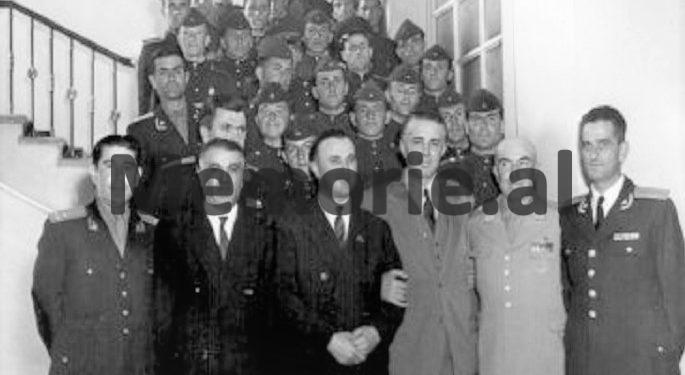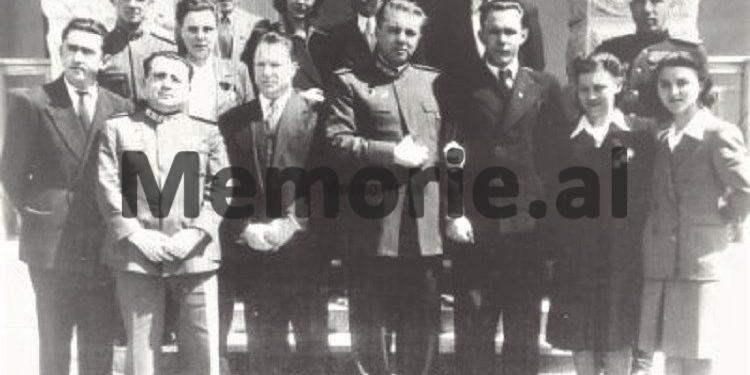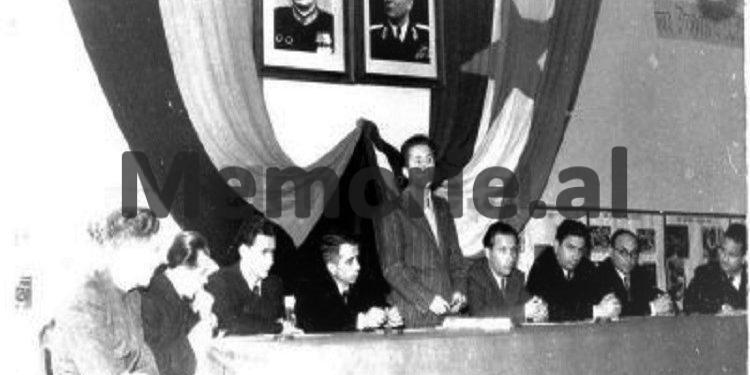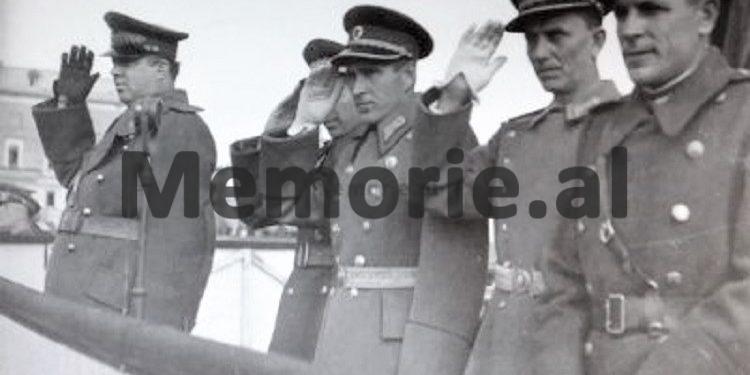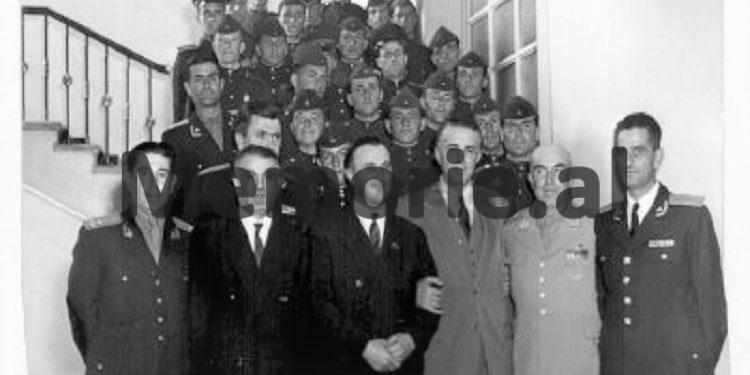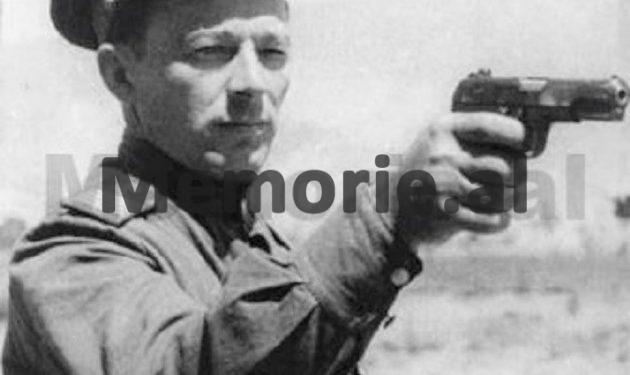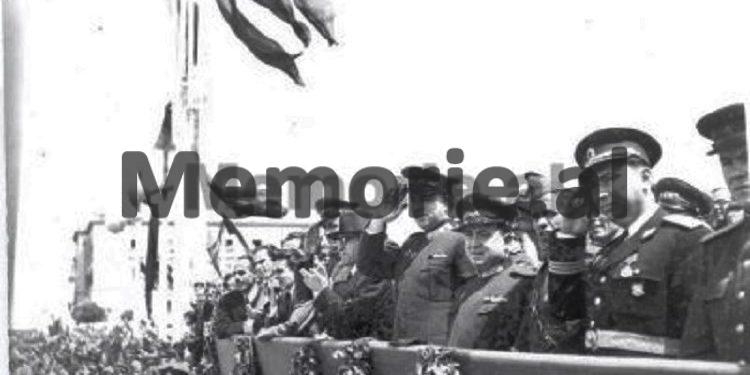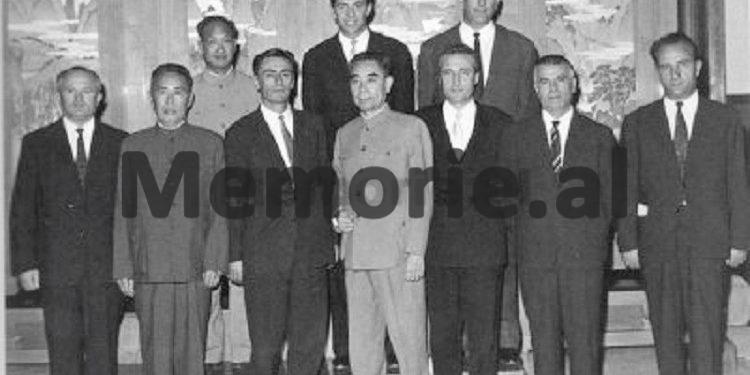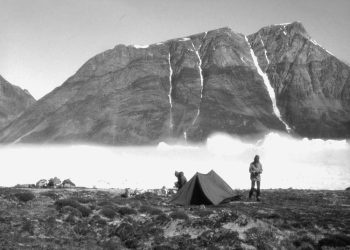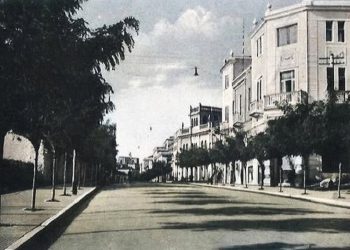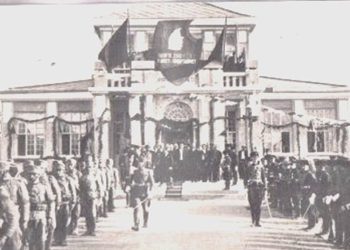Dashnor Kaloçi
Memorie.al publishes the stories of some of the most sensational and controversial “accidental deaths” of communist Albania, where five dignitaries and senior officials of that regime lost their lives in unclear circumstances. Testimonies of family members and relatives with all the details of the mysterious events where they were suicide or killed: Minister of Communications Colonel Njazi Islami, Deputy Minister of Interior Colonel Sali Ormeni, Head of Shkodra Interior Branch Major General Hilmi Seiti, the chairman of the Elbasan Executive Committee Zenel Islami, and People’s Hero Myslym Keta.
Who was Njazi Islami?
Who was Njazi Islam, what was his past, what contribution did he make during the War, and how did he reach the post of Minister of Transport in Enver Hoxha’s communist government? How did his conflict with the senior Communist leadership of that time begin, and in what circumstances did the “accidental death” of Nazi Islam occur? According to the testimonies of his wife, Nazmie Islami (Keçi), given several years ago (to the author of this article), Njazi Islami was born in the village of Salari, Tepelena in 1919, and after the death of his two parents, he received his was raised by his uncle, Dervish Kita (Islam), who at the time lived in Tirana. In 1937 Njaziu along with his cousin, Mehdi Acemi (aunt’s son), went to work in Kuchova, in the Oil sector, which was then administered by an Italian society. During the large demonstration held by the workers of that enterprise at the time, Njazi was considered one of its main organizers, and under the circumstances when he was required by the Italians to be arrested, he was forced to leave and come to Tirana… With the occupation of the country he became closely involved with the Anti-Fascist Movement, linking up with the main leaders of the Albanian Communist Party, and the house he rented on Dibra Street became one of the main bases of senior communist leadership. As a result of his anti-fascist activity, Njaziu was arrested and imprisoned by the Italians, and he was even listed on the list of ten people to be shot, but he was able to escape the shooting after escaping from Tirana prison with the Koci Xoxes group. He stayed for some time illegally and was later appointed commissar in the group commanded by Haxhi Lleshi. He then assumed other high-level duties in the ranks of the Partisan Brigades, reaching the Deputy Commissar of the VI Division who fought as far as Visegrad, Yugoslavia at the time. At the end of the war, Njaziu was appointed to several senior positions and in the First SNP Congress he was elected a member of the SNP Central Committee and was appointed to the post of Minister of Communications.
Njazi Conflict with Enver Hoxha?
Less than a year after the appointment of Njazi Islam to the post of Minister of Communications, he began to have conflicts and problems with senior leadership and personally with Enver Hoxha. But what was the origin of these conflicts? Regarding this, apart from the speech of Enver Hoxha in the 5th Plenum of the Central Committee of the SNP, nothing is known precisely, as Njaziu left nothing written and the contradictions that had arisen with the leaders of the senior leadership. did not even talk to his wife, Nazmi. But from the testimonies of his still-living friends and friends, the origin of Njazi’s contradictions with senior SNP officials and personally, Enver Hoxha, (whom he had escaped from arrest by the Italians while at home) in 1942), was the arrest of his brother-in-law, (his wife’s brother), Colonel Hamit Keçi, who at that time held the post of Chief of Intelligence at the Army General Staff at the Ministry of Defense. According to the report of Enver Hoxha held at the 5th Plenum, while Hamit Keçi was in the investigator, he (Enver) called Njazi several times to the office asking him to denounce and expose his brother-in-law, Hamit. Concerning this, in his memoirs (Enver Hoxha, art. VII, p. 37), Enver wrote: “I called Nazi and we talked for four hours in the office. As for Hamit Keçi, Njaziu said he knew nothing. Even when I asked if they were meeting and what they were talking about, he replied that they only had regular talks at their meetings. Once again I asked if they were discussing issues that were contrary to the party line, he replied that they had discussed economic issues but had not objected to anything. He told me that after reviewing the bureau’s work in the Ministry of Communications, he had decided to close his home and not participate in any social activities. Even Njazi reached out to deny his role as a communist. Njazi asked me to go to a farm and he wanted to make it clear that he had been persecuted and would later see who was right, the Central Committee and the Political Bureau, or Njazi Islam. He later claimed that in the meantime he was gathering facts to prove that it was the Political Bureau that had made mistakes against Nazi Islam and not him. ” Thereafter, at the nearest meeting of the Plenum of the CC, (April 20-23, 1950), Njazi Islam and his two close friends, Abedin Shehu and Shaqiri Kellezi, were expelled from the Central Committee party with the following motivation: “For activity antiparty and Trotskyist to the detriment of the interests of the Party, the people and the People’s Republic ”.
The enigmatic murder of Njazi Islami
Regarding the enigmatic killing of Njazi Islam, in her testimonies, his wife, Nazmia, recalled: “From January 1950, Njazi started coming home very worried, and when I asked him what he had, he told me would say: no, this situation will pass. All those days, before coming home, he would meet with Enver Hoxha, and when I asked him why he was late, he replied: I was there once, letting me know he had been to Enver. On the day that the murder occurred, on February 25, 1951, I left my job at the Ministry of the Interior where I worked as a secretary at the Operations Branch and went home to have lunch. At that time we were living in the villas on Elbasan Street (behind the French embassy), where we were accommodated after becoming a member of K.Q. In the same house was a room used by the State Security for the surveillance of embassies. The entrance to that room was in a hallway where we also entered the house, which had a key and the Security Officer, who we never saw, as he entered there the night we were asleep. After me, at 2:45 pm, Njazi came with his companion, and I noticed that he was very worried. I immediately made him coffee and after he drank it, he left the living room without saying a word. At that time there were two cries that sounded like glass to me, and I immediately left the little girl in the hallway and went out to search the rooms. As I entered the living room, I saw Njazi lying on the floor. He was wearing a wool sweater and at the heart part were the marks of the two bullets from the burn that had made him the cardigan, and as I leaned over to see what had happened to him, I noticed the window curtain moving viewed from the outside courtyard of the villa. But in the state I was in, I didn’t even remember seeing who was behind the half-open window and, sitting as crazy as I could on my head, went out into the street, still screaming. But the moment I got home again, and after checking that Njazi had left some paper on the table, I told a woman we were holding there to take care of the children, to go and alert my mother, who resided near us. In those moments came Njazi’s companion, who called on the phone, and the State Security officers immediately came and grabbed me by the arm and kicked me out. Soon there came Kadri Hazbiu, who comforted me. Then came my brother, Isuf Keçi, who at the time was the Chairman of the Tirana Executive Committee and was trying to calm me down. Security officers did not allow Isuf to go in, but he went in and pushed them hard and urged to sell Nazi. But they didn’t leave a minute inside and pulled him out again. On that day our home was surrounded by Security officers who prevented anyone from coming in except for three of the four women from my family circle. These were the enigmatic circumstances of the death of her husband, Njazi Islam. What was the attitude of the SNP senior leadership regarding this event? Nazmie Islami recalls: “On the day after that event, Radio Tirana and the newspapers declared Nazi a traitor and enemy of the people. The same day, the security arrested my brother, Isufi (his other brother, Hamiti, was sentenced to 10 years in prison), not allowing him to attend the funeral of Njazi. His arrest was made at Kadri Hazbiu’s office, where he was allegedly summoned for a meeting. After that event, I returned to the brothers’ house, where I was visited by security officers every day, pressuring me to leave and calling me an enemy of the people. ”
Who was Sali Ormeni?
One of the other “accidental deaths” that occurred a few days after that of Minister Njazi Islami was that of Deputy Interior Minister Lieutenant-Colonel Sali Ormeni, an incident that occurred on March 3, 1951, for which official Tirana, quoting a statement from the Interior Ministry, among others it stated: “The Commander-in-Chief of Police and Deputy Minister of Internal Affairs, Sali Ormeni, had killed himself in an attempt to flee to the Paprri forests in Elbasan.” . But who was Sali Ormen, what was his past, what functions did he hold until the day he died, and in what circumstances did his death occur? According to the testimonies of his relatives, Sali Ormeni was born on January 14, 1914 in the village of Tragjas, Vlora, where her family is from. Saliu was early associated with the Anti-Fascist Movement and on January 3, 1943 he was accepted as a member of the SNP. During the War, he was commissioned and carried out a number of high-profile tasks, reaching the rank of commander of the Third Brigade in October 1944. During the War and beyond, in the province of Vlora and the whole Labyrinth, Sali Ormen was considered one of the most valiant and heroic partisans of the War, as he received seven bullet wounds to the body. Even after the end of the war he carried out a number of functions, such as: Commander of the Second Brigade of the People’s Division, Operative and Chief of Staff of the People’s Division (December 1944), Deputy Commander Division (February 1945), Commander of the Police School Populore (1947), Director General of the National Police (1948), candidate for the Central Committee of the ASP in the First Congress (1948), member of the CC of the LPS and MP in the People’s Assembly (1949), Deputy Minister of the Interior and Director General of the Police with the rank of Lieutenant Colonel (1949), a position he held until he died in mysterious circumstances on March 3, 1951.
The Ormeni conflict with Enver, Mehmet and Kadri
The Ormëni conflict with senior SNP leadership began just hours after news broke that a bomb had exploded at the Soviet embassy in Tirana, an event that has since been known as: “The embassy bomb incident” Soviet “. According to the testimony of Sali Ormen’s nephew, retired colonel Xhemal Imeri (a graduate of the USSR academies). Sali Ormeni’s controversy with his minister, Mehmet Shehu, had begun before that event, when Mehmet wanted to remove Ormen from the post of deputy minister and bring Kadri Hazbi, who was at the time Chief of Army Security. The Armenians with Hazbi had been at odds since the wartime, and they grew even more aggravated by an incident between them in 1949 on the anniversary of the Drashovica War, where the conflict between them degenerated to pistols. That event, which took place at the grandstand, was also confirmed by Ormeni’s nephew, S. Alimeroko, former chairman of the Vlora Executive Committee. After that event, there would be another blow for Ormen, not without consequences, but this time by Enver Hoxha himself. According to the testimonies given by Ibrahim Sihati, Hito Alimerko and Imer Gjondeda, during a visit to Ormëni in his constituency (Tragjas, Rraktime etc), he noticed an extreme poverty and for this he immediately asked Enver Hoxha for a meeting, to whom he made known the situation. But he not only found no support from Enver Hoxha for the bad economic situation that had plagued the area where he was a deputy, but was badly separated from that meeting. According to Ormen’s own testimony, Enver had called him; fatalistic and capitulating, before the difficulties the party was going through. After this meeting, Sali Ormen began to be seen with another eye by senior leadership. A few days later he was called to the office by Mehmet Shehu, who pressured him to share his wife, as her brothers were sheltering divers. Armenia strongly disagreed saying it could not share the mother of five children, but was eventually forced by the circumstances surrounding them to do so. Thereafter, the “friends who had suggested” sharing with the woman, “introduced him and offered to marry” another woman. During the time she was acquainted with him, Sali was “struck” by a very secret document, which she was accused of stealing from her acquaintance who had been an agent. Concerning these machinations that Security used to implicate Armenia and remove him from the post of Deputy Minister of Interior, in his IX work, Enver Hoxha wrote inter alia: The IXs manifested a nervous crisis by saying that they had made serious mistakes against the party. He was advised to go to hospital and when he recovered he would openly tell the party the mistakes he had made. ” And while Armenia was in these difficult situations, the bombing at the Soviet embassy in Tirana and the burning of the Friendship Association of Albania headquarters took place.
Ormëni in ministry: Bomb at embassy dropped by State Security
Ferit Pilkati, who at the time served as Security Operations Officer in one of Tirana’s regions, testified about the incident of the Soviet embassy bombing and the Ormëni conflict with Mehmet Shehu. stated: “On the day after that event, the Minister of the Interior, Mehmet Shehu, gathered us in the meeting room and after talking to us about the grave event that had taken place, he read us a list of 22 names that had been arrested overnight, and gave us instructions and orders for the arrest of 70 other people to be arrested that day as directly implicated in the incident, which were written on a letter. As the minister said these words, Sali Ormeni was brought up and addressed to Mehmet, said: Mehmet Shehu, do not take people in vain. That they are not the ones who committed that act. It is the other hand that designed it. With the word; on the other hand, Armenians openly implied that it was State Security. After saying those words, he left the room without permission. As he was leaving, Mehmet Shehu said Saliu would hold the party accountable for the move, as relations with the Soviet Union were being called into question. Coming out, Saliu told Mehmet that he was going to comply with the order given to him to be hospitalized, “concludes Pilkat’s testimony about the Ormëni denunciation of the bombing at the Soviet embassy in Tirana. On the same day, Ormëni was hospitalized and, according to the State Security order, doctors gave him a diagnosis of “nervous shock”. According to the testimony of Armenian grandson Xhemal Imeri, Saliu’s hospitalization was a State Security ploy to dismiss him as irresponsible for the statement he made before senior officials of the Interior Ministry and the minister himself, Mehmet Shehu. Imeri testifies that in that room the Armenian hospital was closely monitored by two Security Officers (I. S. and I. A.), one of whom was hospitalized next to his bed, allegedly ill. The following day, on March 4, 1950, the Ministry of the Interior, through an official communication, announced that: In an attempt to escape the Papër forests in Elbasan, the Director General of State Police and the Deputy Minister of Internal Affairs The interior, Sali Ormeni, had killed itself ”./ Memorie.al
follows tomorrow




